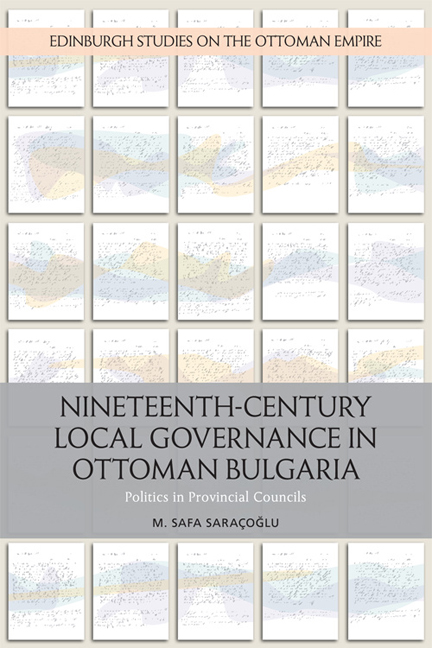Book contents
- Frontmatter
- Contents
- List of Maps, Figures and Tables
- Abbreviations
- Preface
- Map
- 1 Introduction
- 2 Contextualising the Nineteenth Century
- 3 Sitting Together: Local Councils and the Politics of Election in the County of Vidin
- 4 Once Inside the Chamber . . . Participation in the Politics of Local Administration
- 5 Writing Politics: Ottoman Governmentality and the Language of Reports
- 6 ‘Cattle Thieves’: Refugee Settlement, Ottoman Governmentality and Biopolitics
- 7 Conclusion
- Select Bibliography
- Index
1 - Introduction
Published online by Cambridge University Press: 24 April 2021
- Frontmatter
- Contents
- List of Maps, Figures and Tables
- Abbreviations
- Preface
- Map
- 1 Introduction
- 2 Contextualising the Nineteenth Century
- 3 Sitting Together: Local Councils and the Politics of Election in the County of Vidin
- 4 Once Inside the Chamber . . . Participation in the Politics of Local Administration
- 5 Writing Politics: Ottoman Governmentality and the Language of Reports
- 6 ‘Cattle Thieves’: Refugee Settlement, Ottoman Governmentality and Biopolitics
- 7 Conclusion
- Select Bibliography
- Index
Summary
This book examines the politics of judiciary and administrative practices in Vidin County during the 1860s and 1870s. Today Vidin County is in modern-day Bulgaria, but between 1396 and 1878 it was a county under Ottoman administration. It became a part of the Danube Province when the latter was founded in 1864 in conjunction with an imperial reform that redefined the administrative divisions of the empire; under the new system, Vidin County (liva or sancak) included the districts of Vidin (the administrative centre), ‘Adliye (modern-day Kula), Belgradcık (Belogradchik), Berkofça (Bergovitsa), İvraca (Vratsa), Rahova (Rahovo) and Lom (Lom). The 1864 Ottoman Provincial Regulation also introduced a provincial bureaucratic framework that placed local judiciary and administrative councils at the centre of local governance. This book examines these councils to illuminate the contested politics of Ottoman provincial administration in the long nineteenth century.
Although the 1864 regulation marked a seminal moment in provincial administration, it was part of the larger Ottoman transformation to the ‘liberal-capitalist social formation’. Thus, the offices and procedures generated with this regulation provide a lens through which to view the broader imperial transformation from the provinces. It was the prominent Ottoman statesman, Midhat Paşa, who was responsible for this regulation and he first applied it in the Danube Province, where he served as the first governor of the first province established by the same regulation. Midhat Paşa's vision for the administrative divisions’ structure and functions had its opponents but, at the end of the day, his perspective determined modern Ottoman provincial governance. Several of his contemporaries praised his personality and efforts, including John A. Longworth, British Consul General in Serbia, who visited the province in 1865 to observe the new order: ‘A man [of] quick versatile powers … [with a] love for order’ who was ‘peculiarly [qualified] for the task of organisation’, which he executed with a level of ‘intelligence and vigour … [that] blinded [the Consul] to its shortcomings’. Therefore, as part of Midhat Paşa's inaugural province, Vidin County serves as a good starting place to examine imperial change coming from the provinces.
- Type
- Chapter
- Information
- Nineteenth Century Local Governance in Ottoman BulgariaPolitics in Provincial Councils, pp. 1 - 13Publisher: Edinburgh University PressPrint publication year: 2018



